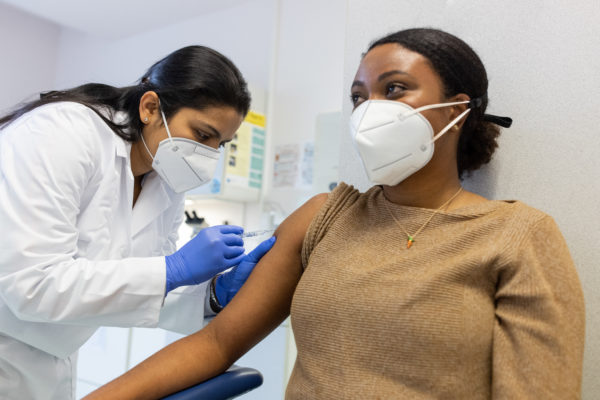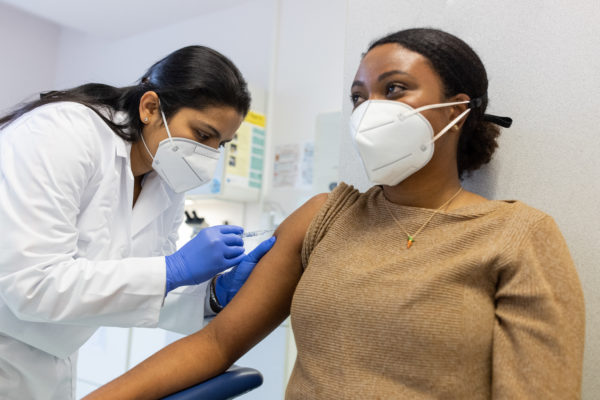If COVID-19 Vaccine Mandates Are Coming, Can They Be Enforced? Legal Experts Say Maybe.
Over 93 million people in the U.S. have received COVID-19 vaccinations, according to a data tracker from the U.S. Centers for Disease Control and Prevention.
That includes 32 million, or 9.7 percent of the nation’s population, who’ve been fully vaccinated.
More than 2 million Americans are being vaccinated each day. A new daily record was set Saturday, March 6, when about 2.9 million doses were administered, the White House announced Monday.

As the supply of COVID immunizations becomes readily available for more segments of the general population, the focus turns to the complicated issue of vaccination mandates. Can your job, church, school, grocery store and other institutions in your daily life require you to get a shot?
The simple answer is yes. But legal scholars say it isn’t that simple.
“I think there would be some legal risk to an employer that chose to make a vaccine mandatory,” Emory law professor Dr. Ani Satz told Fox 5 Atlanta. “But I think there’s some legal arguments to support that choice.”
According to the CDC, the federal government doesn’t mandate vaccination. However, state and local governments can require vaccinations for some healthcare workers and frontline employees like teachers, firefighters and postal workers.
In order to mandate the vaccines, employers must make accommodations for religious beliefs and disability-related objections, according to a report the U.S. Equal Employment Opportunity Commission released in December. Not believing in vaccines is not part of the exemptions.
EEOC cautioned employers to try to work with employees who initially refuse the shots and advised that “the first move is not termination.”
Legislators in at least 27 different states have introduced bills to block employers from mandating adult vaccinations, NBC reported. Florida proposed a bill to keep businesses and airlines from turning away customers who haven’t received the shots. But most of those bills have failed to pass muster.
Many states do have requirements for health care workers and public school students.
A 34-year-old New York City waitress told the New York Post she lost her job at a popular Brooklyn restaurant because she refused to get the vaccine. Bonnie Jacobson claimed she worried the doses could limit her chances of getting pregnant.
“It was shocking to me,” she told the Post. “The way I see it, getting the vaccine is for me. It protects me. If I am not getting it, it’s my choice, and I’d only be hurting myself.”
Dorit Reiss, a professor at the University of California Hastings College of the Law in San Francisco, told NBC the mandates may be what’s needed to ensure protections for workers.
“We have a long history of vaccine requirements in the workplace. It’s a health and safety rule, just like wearing gloves,” she said. “Employers have a baseline duty to create a safe environment for their employees and patrons.”
No airlines have enforced vaccine mandates for passengers — yet. But there’s a possibility that could be on the horizon, a travel tips advisory from AARP warned. Airlines have already begun testing “health passports,” an app that could prove passengers are COVID-negative before they board commercial flights.
Some international flight destinations could also require vaccinations before allowing visitors onto their soils without imposing restrictions like a quarantine.
Blacks have been disproportionately underserved when it comes to COVID vaccines. Only 7 percent of the shots had gone to African-Americans by March 1, according to the Kaiser Family Foundation. CDC data showed a racial/ethnicity breakdown for only 54 percent of all vaccines administered.
A Kaiser survey in February showed that 41 percent of Black women and 45 percent of Black men were taking a “wait and see” approach before getting the vaccines. About a third of all Americans say they won’t get any doses.
Those holdouts have wiggle room for the time being. Attorneys said all three vaccines are currently being administered under Emergency Use Authorization. That precludes employers from obligating workers to get them, the legal reps say.
“With a lot of people resistant to vaccines, there’s a question of trust,” Dr. Fazal Khan, a University of Georgia Law School professor, told Fox 5. “Do you trust going out to a crowded stadium? Do you trust going to a crowded restaurant if you don’t know whether the people sitting next to you are vaccinated?”

